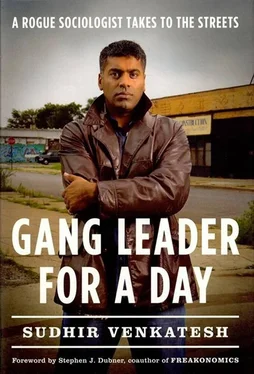For several days after I interviewed Cordella, I kept thinking of what she said: “It was a time for women, a place for women.” Her nostalgia reminded me of how Catrina, Ms. Bailey’s assistant, spoke so reverently of women helping each other in the building.
I spent the next three months focused on meeting the matriarchs of the high-rises. There were plenty to choose from: more than 90 percent of the four thousand households in Robert Taylor were headed by a female. Whenever Ms. Bailey introduced me to an elderly dressmaker or a grandmother who offered day care to working parents, I tried to solicit stories about the past as well as details of her current enterprise.
Many of these women had protested for civil rights in the 1960s and campaigned for black political candidates in the 1970s; they took the need to fight for their community very seriously. But during the 1980s and 1990s, as their plight was worsened by gangs, drugs, and even deeper poverty, they struggled just to keep their families together. By then the housing authority had grown corrupt and un-supportive, the police were largely unresponsive, and the tribe of strong women had been severely marginalized.
While the official statistics said that 96 percent of Robert Taylor’s adult population was unemployed, many tenants did have part-time legitimate jobs-as restaurant workers, cabdrivers, cleaning ladies in downtown corporate offices, and nannies to middle-class families. But nearly all of them tried to hide any legitimate income from the CHA, lest they lose their lease or other welfare benefits.
There were also working men living in Robert Taylor, perhaps a few dozen in each building. But they stayed largely out of sight, again because of the CHA limits on how much money a tenant family could earn. Sometimes a man would leave home for a few weeks just to keep the CHA inspectors off guard. So when I or someone else they didn’t recognize came into an apartment, the men might head for the back room. They didn’t attend many tenant meetings, and for the most part they let the women handle the battle for better living conditions. The absence of men in Robert Taylor had made it that much easier for the gang members and pimps to essentially have the run of the place.
As I began compiling statistics on the illicit earnings generated by women throughout Robert Taylor, it became obvious that all their illicit earnings combined hardly constituted a lucrative economy. Selling food or candy out of your apartment might net you about twenty dollars per week. (Cordella Levy managed to do better than that, having persuaded a local grocery store to sell her candy wholesale in return for steering her customers to that store for their groceries.) Day care brought in five or ten dollars per day per child, but business wasn’t steady. A woman could earn more selling sex, but that was risky in a few ways. One of the favored moneymaking options, therefore, was to take in a boarder, which could generate a hundred dollars a month. There was never any shortage of people who needed a place to stay.
But I also discovered something more interesting, and probably more important, than the money that changed hands in these various transactions. Many households participated in a vast web of exchange in which women borrowed, bartered, and pooled their resources to survive. One woman might offer day care for a large group of women, another might have a car and contribute by driving folks to buy groceries, and other women might take turns cookingfor various families. In some cases the members of a network maintained a fixed formula of exchange: If you cook my family five dinners, I’ll take care of your kids for two days.
Often a network of women would share their apartments as well. Let’s say there were five women on one floor whose apartments had maintenance problems (which, given the condition of the buildings, wasn’t uncommon). There was little chance that the CHA would respond to all their repair requests, and the women couldn’t afford to pay five different bribes to Ms. Bailey or the CHA building manager. These women would pool their money to make sure they could pay the necessary bribes so that at least one apartment in their network had hot water and at least two had working refrigerators and stoves; perhaps one of them would also pay for pirated cable TV. Everyone would shower in one apartment, cook in another apartment, keep their food elsewhere, sit in the one air-conditioned room to watch the one TV with cable, and so on. To have your own apartment with all utilities functioning was a luxury that few people expected in Robert Taylor.
I met most of the neighborhood’s male hustlers by hanging out in the local parking lot with C-Note. He let people know that it was safe to speak with me. There were always a lot of men milling around, talking and drinking, who represented the diversity of the neighborhood hustlers: carpenters who did inexpensive home repairs, freelance preachers, truck drivers who worked off the books for local factories, car thieves, rappers and musicians, cooks and cleaners. All of them made their money under the table.
Most of them had once held legitimate jobs that they lost out of either misfortune or misbehavior. Until a few years earlier, they could have gotten a few hundred dollars a month in welfare money, but by 1990, Illinois and many other states eliminated such aid for adult men. The conservative revolution launched by President Ronald Reagan would lead eventually to a complete welfare overhaul, culminating in the 1996 directive by President Bill Clinton that made welfare a temporary program by setting time limits on just about every form of public aid-for men, women, and children.
For men like the ones in Robert Taylor, the welfare changes only exacerbated their poverty. They all learned to keep track of which restaurants and churches offered free food and which abandoned buildings were available for sleeping. Like the women, the men also had a network: One would cook while another looked for work while yet another tried to find a place for all of them to sleep. If they heard of a vacant apartment, they’d pool their resources to bribe the CHA building manager, gang leader, tenant leader, or whoever else happened to have the key. These men also passed along information to cops in exchange for “get out of jail free” promises, and they could always make a few dollars from CHA janitors-who regularly paid off hustlers to clean the buildings when they felt like taking a day off.
C-Note introduced me to Porter Harris, a bone-thin man, sixtyfive years old, who spent much of his time scouring the South Side for recyclable junk. When I met him, he was pushing a shopping cart filled with wire, cans, and metal scrap, trolling the tall grass between the high-rises and the railroad tracks. Years ago, Porter told me, he was the one who dictated where various hustlers in Robert Taylor could work, sell, and trade, much as C-Note did now. But he’d had to leave because of a battle with a gang leader.
“Booty Caldwell, real name was Carter,” he told me in a southern drawl. “That was the one who kicked me out of here for good.” Porter picked at his few remaining teeth with a blade of grass. He wore a floppy straw hat that made him look as if he’d stepped out of a faded photograph from the Old South. “There were about ten of us. I controlled Forty-seventh Street to Fifty-first. I had this whole area-you couldn’t sell your soul without letting me know about it, yessir.”
“Sounds like a good living,” I said, smiling. “You were the king of hustlers?”
“Lord, king, and chief. Call it what you want, I ran that area. And then one day it all was taken away. By Booty Caldwell. He was part of the El Rukn gang.” By the late 1960s, El Rukn had become the most powerful gang in Chicago. They were widely credited with uniting many independent gangs, making peace treaties and cooperative arrangements that resulted in a few El Rukn “supergangs.” But a federal indictment in the mid-1980s weakened El Rukn, allowing other gangs, including the Black Kings, to take over the burgeoning crack trade.
Читать дальше












